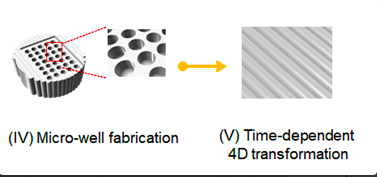Neural stem cells (NSCs) exhibit great promise for treating neurodegenerative diseases and injuries. Treatments will rely on efficient proliferation and differentiation of NSCs into neurons with therapeutic characteristics. Static 2D and 3D microenvironment culture substrates fail to cater to the dynamic cell needs, resulting in sub-optimal, inefficient and uncontrolled differentiation of NSCs. Substrates with micro-wells encourage NSC spheroid formation and cell proliferation, while substrates with micro-grooves are good for maturation, including neurite growth and alignment.
GW researchers created a 4D programmable culture substrate with a self-morphing ability to enhance the growth and differentiation of NSCs. The surface of the 4D printed substrate gradually morphs from micro-wells to micro-grooves in response to the heat of a tissue culture incubator. This invention may also be applied to other stem cells encountering dynamic physical and chemical cues during development. This 4D culture technique may be used to mimic specific developmental behaviors of different cell lines for improving tissue regeneration, disease treatment, and drug discovery etc. The invention is currently at lab-scale production.

Figure: Illustration of micro-wells transforming into micro-grooves over time at 37°C.
Applications:
- Study cancer or diseased cell behaviors to explore new drugs and/or disease mechanism
- Mimic unique differentiation microenvironments of native tissue/organ
Advantages:
- Time-dependent topographic transformation recapitulates physiological environment
- Increased proliferation
- Longer and faster neurite growth